
Business owners who have actively or have previously delved into the exciting world of Digital Marketing maybe quite familiar with Search Engine Optimization (SEO). Traditional SEO operates based on the whims and changes of search engine algorithms and how extensive your campaign can generate links. Almost all efforts are focused towards these two elements that define traditional SEO. This has been the practice for some time.
But the online community is changing. Consumers and online users are putting more attention now on social signals and high-quality content that is relevant for their needs. That is why business owners and digital marketers need to make a fresh assessment of their Search Engine Optimization efforts.
This should evolve into a holistic, customer-centered, integrated and interconnected approach, focusing on a new and much broader perspective on how targeted customers search and look for information, products and services – and the following will tell you why.
The infographic (click to zoom):
How Traditional SEO Work
The following diagram from The Moz Blog provides a good description of what the traditional process of SEO is involved with. As can be seen from this diagram, traditional SEO is focused more on creating a page structure where targeted keywords can be integrated. Once the page and keyword structure is established, the link building process ensues. But as will be explained in the following, this type of SEO structure may not be effective with new changes in the online landscape.
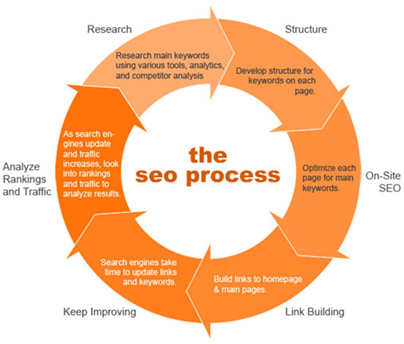
Traditional SEO Focuses only on Keywords and Not About Satisfying Needs
With traditional SEO, digital marketers often ask their clients questions about their desired keywords to focus on as well as who their main competitors are. SEO efforts will then commence surrounding these inputs without a clear cut understanding if these keywords and actions will be substantial in helping them meet their business goals.
Traditional SEO Focuses on Short Keywords
The main goal of traditional SEO is to rank high on the first pages of search results focusing on single-term keywords or short keyword phrases (1 to 2 words) to generate maximum traffic. Search behavior is continuously evolving however and the trend has shifted to the use of long-tail keywords.
A report from Small Biz Trends indicate that up to 70% of search traffic is already focused on long tail keywords (>2 words), leaving only 30% (which has far more competition) to short keywords.
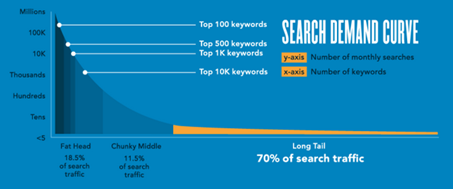
Traditional SEO Has Little Regard for the Audience
One of the problems with traditional SEO is that it is more focused on trying to rank high using targeted keywords and less on trying the fulfill the needs and requirements of the people using these keywords to make searches.
Generating traffic is of course one of the main purpose of Digital Marketing. Traffic however would have a lot more meaning and importance if they lead to conversion, that’s what SEO should be about – proving for the needs of your targeted customers.
Traditional SEO Disrupts Other Digital Marketing Campaigns
Many digital marketing strategies are straightforward in their sets of actions and expected results. Paid advertising and other paid channels depend on how much you have invested on your ads and careful planning is performed to ensure that your paid ads attract and generate the right kind of traffic that brings in the ROI.
Traditional SEO however performs almost a shotgun approach to generating as much traffic as you can through massive link building and other related activities. It disrupts activities of other digital marketing channels, like the personal branding Social Media Marketing is trying to achieve.
Traditional SEO Link Building Techniques are Shallow
One of the main drivers of traditional SEO is to generate as much links as possible through whatever means and channels available. This can generate a considerable amount of traffic and ranking in search results. However, changes in search behavior puts more importance on building social relationships and how a particular content is generating news and buzz online. A shallow link building strategy will not be able to generate this kind of impact with search users.
How Holistic SEO Work
With Holistic SEO, the focus is on the search users and not on keywords or even the search engines. It’s focused more on how people engage with a particular brand, product and service – which will eventually be the main factors in how these businesses will be ranked by the search engines.
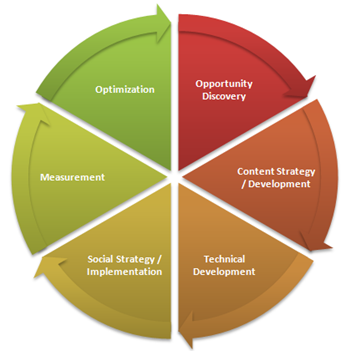
https://d1avok0lzls2w.cloudfront.net/img_uploads/new-seo-process.png
The diagram above from The Moz Blog describes the processes involved in Holistic SEO, which have evolved from merely focusing on keywords and link building. These holistic activities are focused more in delivering a better online experience for users and fulfilling their needs and what they are seeking for in real time. Aside from these, the following describes other attributes of Holistic SEO.
Holistic SEO Caters to the Specific Needs of Search Users
Holistic SEO makes use of long-tail keywords to cater to the more specific needs of search users. The Small Biz Trends study established that head keywords (those that are only composed of 1 to 2 main words) are characterized by high search volume but low ranking potential.
On the other hand, long-tail keywords (those that are made up of greater than 2 words which may include the main keywords and descriptive words) have lower search volume but has greater ranking potential. This is because long-tail keywords cater to the more specific needs of search users – and will most likely provide the answers they need.
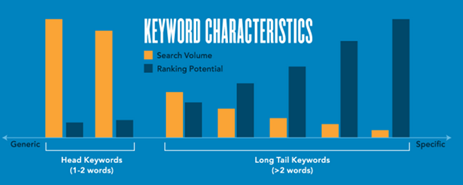
Holistic SEO Applies a Semantic Approach to Link Building
Links building would still be an important factor in the Semantic Web. But unlike traditional SEO that focuses more on building as much link as possible from whatever source available, link building will be performed in a holistic and semantic manner.
Link building strategies will be as natural and organic as possible, putting an emphasis on social relationships – which are now fast evolving as some of the most important factors that will matter most in semantic search.
Holistic SEO Focuses Strongly on Content Marketing
In Holistic SEO, providing high quality content is the main marketing drive. Content is your main portal for engaging with your targeted audience and this will matter strongly in semantic search. Holistic SEO is also about integration and so part of its main strategy is to integrate content marketing with other Digital Marketing strategies like Social Media Marketing and Pay-Per-Click Advertising.
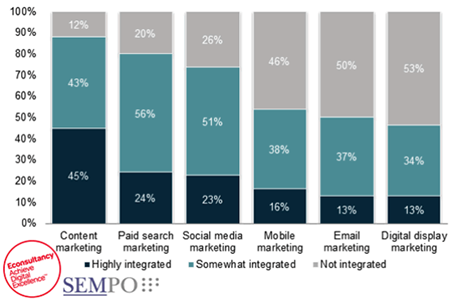
The chart above is taken from the State of Search Marketing Report 2013 released by SEMPO and EConsultancy. The report highlighted that 45% of digital marketers believe that content marketing is already highly integrated with SEO.
Holistic SEO Focuses More on Brand Acceptance
Traditional SEO is focused more on generating traffic and optimizing websites based on keywords. It is not focused however on whether the generated traffic buys in or accepts the brand and business. In Holistic SEO, conversion optimization and brand acceptance is integrated with SEO and other digital marketing strategies to attract highly targeted traffic that accepts the brand and is more likely to convert as leads or sales.
Holistic SEO Focuses on Building a Better World Wide Web
In Holistic SEO the search user – the consumer – will receive most of the benefits. Businesses will of course benefit from Holistic SEO but catering to and fulfilling the needs of their targeted customers will be a win-win situation for both. The result will be a better World Wide Web where a better interaction between brands, businesses and consumer will take place – and this will happen only with Holistic SEO.
The digital search ecosystem is fast evolving. While much of the process involved in traditional SEO will remain constant and will still be used, focus will be shifted from keywords and search engines to those that matter the most – the consumers. Business owners and digital marketers should also make this shift in their approach towards SEO, using an integrated, semantic and holistic approach to search.
Jomer B. Gregorio is a well-rounded expert when it comes digital marketing. Jomer is also known as a semantic SEO evangelist and practitioner. Check out our Digital Marketing Services today and let us help you in achieving positive and profitable results for your business.

